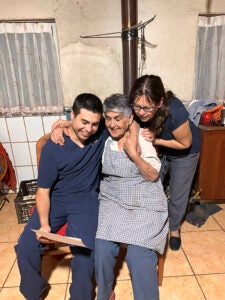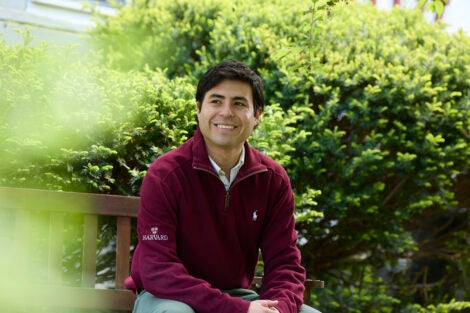Chilean dentist Alberto Inzulza Galdames, MPH ’24, wants to improve access to health care for people in vulnerable communities.
May 16, 2024 — When Alberto Inzulza Galdames was growing up in rural Chile, the health inequities in his community became apparent to him in a very visible way: As people got older, they stopped smiling. Dental care was hard to come by in his village, which was hours away from the nearest city and, for many, such as Inzulza Galdames’ mother and grandmother, it was low on a list of pressing financial needs. When he became a dentist, he started to see bad teeth as more than just a source of pain but a symptom of the ways that lower-income people around the world are failed by health systems.
Inzulza Galdames came to Harvard T.H. Chan School of Public Health to learn more about how to improve access to health care for people like those in his community. This month, he’s graduating with a degree in global health and population and concentrations in public health leadership and humanitarian studies.
He plans to return to seeing patients in Chile, but with a broader perspective on how to advocate for their needs. Building on policy work in the Chilean government that he started prior to coming to the School, Inzulza Galdames hopes to contribute to the development of a more inclusive and equitable health care system and to promote evidence-based public health policies to enhance quality of care.
“I don’t feel I’m just a citizen of Chile now,” he said. “I feel like I’m part of something bigger.” No matter where they come from, public health professionals share the same values, he said, “Equity, dignity, justice, and human rights for everyone.”
The power of persistence

One major ambition driving Inzulza Galdames’ work in public health is finding ways to lift up others from backgrounds like his. During Inzulza Galdames’ childhood, his family struggled financially. They were temporarily homeless when he was a teenager, and he worked as a blueberry picker to help. He still gets choked up thinking about the sacrifices his mother made for him. “She taught me the power of persistence,” he said.
Things started turning around when he was in high school and became friends with an American exchange student. This individual’s family brought Inzulza Galdames to the U.S. for a visit that included a trip to Harvard’s Cambridge campus. He dreamed of returning to Harvard to study and did so for two summer programs while he was an undergraduate and dental student at Finis Terrae University in Providencia, Chile. One of these, the Global Health Delivery Intensive, was led by the late Paul Farmer. Inzulza Galdames said the renowned global health physician and medical anthropologist inspired him to stay curious about the world and engaged with the people he serves.
Building on connections from this program, Inzulza Galdames took time while earning his degree to become an exchange student in Japan and a volunteer teacher and dentist in Nepal, where he also started a nongovernmental organization focused on promoting health education and gender equity.
But even as he traveled the world, Inzulza Galdames remained firmly rooted in his family and community. After he graduated, he became a dentist in the city of San Clemente, near where he grew up. His first patients were his mother and grandmother.
A frontline perspective on migration
While he was working as an emergency dentist doing evening shifts, Inzulza Galdames added a new, unexpected role to his resume—government employee. Looking into new educational opportunities, he came across a scholarship that required experience in public service. Having had his appetite for politics whetted by serving as student body president at Finis Terrae, he decided to reach out to various local government officials and pitch himself for a job. To his surprise, one decided to give him a chance.
Inzulza Galdames started as a parliamentary advisor, aiding members in Chile’s lower house of Congress, just weeks into the COVID-19 pandemic and found himself tasked with helping Chileans in Asia return home. He branched out into other legislative and community engagement projects, and after two years was appointed chief of staff of the Regional Secretariat of the Ministry of Education. There, he was involved with efforts to get kids vaccinated and back in school following pandemic closures. Throughout, he never gave up his evening clinical work, powering through his hectic schedule with a positive attitude and plenty of coffee.
He found that he loved political work. “If you don’t get involved, you can’t transform society,” he said. In order to learn more so that he could do more to improve public health in Chile, he decided to apply to Harvard Chan School.
At the School, Inzulza Galdames said, “People always ask me why I’m smiling all the time, and I say being here was my dream.” The past nine months have been a whirlwind. He became vice president of student advocacy for the Harvard Chan Student Association (HCSA) and an active member of the LGBTQ+ community, and represented HCSA at the LGBTQ+ International Leadership Conference in Washington, DC, last fall. He took classes in government and business at other Harvard schools and joined the University rowing team. And he’s dug deep into health system reform and found inspiration from his diverse classmates and their experiences addressing public health challenges around the world.
For his practicum requirement, Inzulza Galdames decided to give himself a challenge. He had been studying global migration and felt that to better understand the experiences and needs of migrants, he needed to talk to them and walk in their shoes. During the School’s Winter Session in January, Inzulza Galdames and Namanjaya Khobragade, MPH ’24, joined Guatemalan migrants on the route to Mexico City, traveling for 74,378 miles by bus, raft, and foot. Along the way, they conducted 30 interviews with migrants. In Mexico City, they helped run camps offering free health services to migrants and community members, and worked with a local interdisciplinary team of clinicians, social workers, and others to create a map of free services such as food distribution, showers and bathrooms, and legal advice. The goal was to raise awareness around resources and referral systems, bridge gaps in care, and to build networks among organizations working with migrants, Inzulza Galdames said. He has presented the results of his work to Mexico’s Congress and the office of the United Nations High Commissioner of Refugees.
“Alberto is an incredibly motivated and humble person who uses his seemingly endless energy to improve public health for the world’s most vulnerable,” said Sean Kivlehan, assistant professor in the Department of Global Health and Population, who was Inzulza Galdames’ instructor in the Humanitarian Response Intensive Course he took this spring. “I feel lucky to have been a part of his journey at Harvard Chan School, and like many others have been inspired by his passion.”
In addition to Kivlehan, Inzulza Galdames highlighted the support and mentorship he received this year from Nancy Turnbull, senior associate dean for educational programs, and Maritza Hernandez, associate dean for student services.
In recognition of the mark he made at the School during his short time here, Inzulza Galdames was selected as a Commencement Marshal, meaning that he’ll walk at the head of the School’s procession at the University’s Commencement Ceremony. He’ll also represent his class on the School’s Alumni Council. He was a keynote speaker at this year’s Fellowship Celebration for students who receive financial aid, and was elected to be the keynote speaker for Harvard’s Lavender Graduation, a celebration of graduating LGBTQ+ students.
As he plans the next stage of his career, Inzulza Galdames hopes to continue doing work where he can keep “my head in the science and evidence, my feet on the ground to remind me of the needs of the populations I serve, and my heart in the values of public health.”
But first, he plans to take a little time to process this past year, which he describes as “like watching a whole season of a show on Netflix too fast.” As soon as he gets back to Chile, the first thing he plans to do is hug his mom.
Photos: Kent Dayton; Courtesy of Alberto Inzulza Galdames
